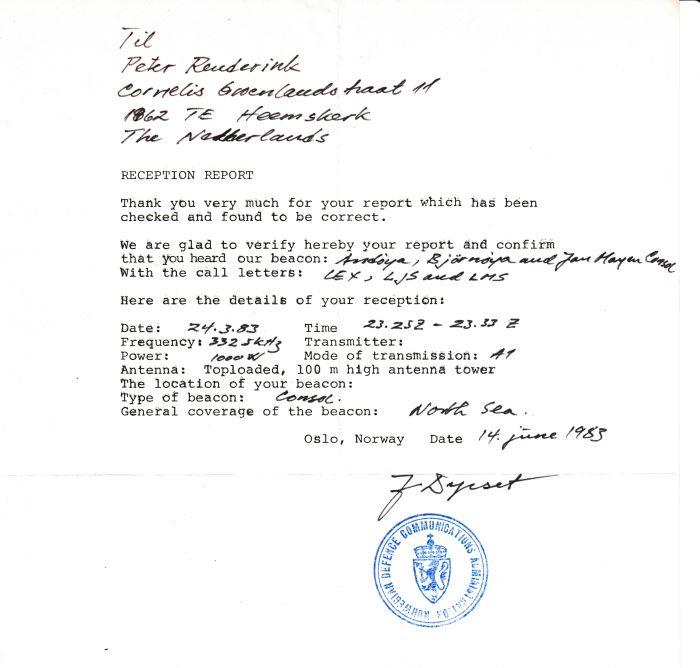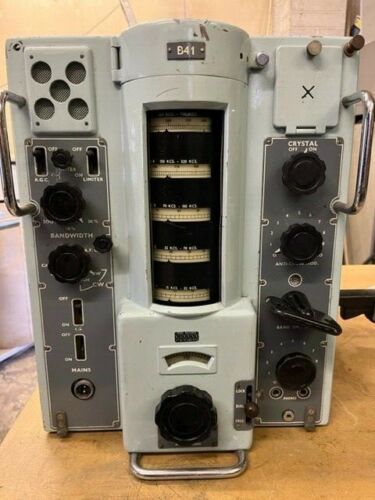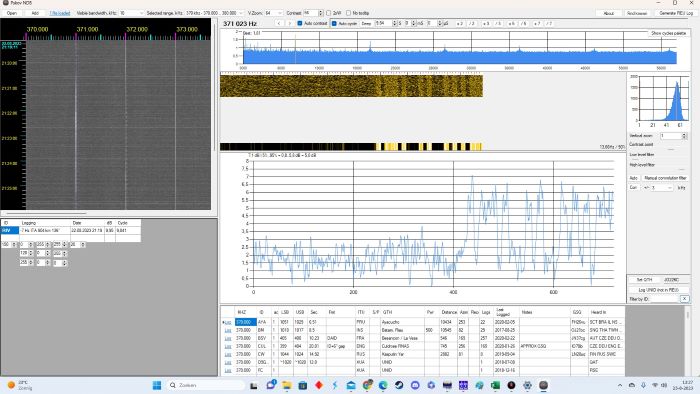Don’t know why but I always liked NDB (Non Directional Beacon) DX-ing. Maybe because it because it is all about low power stations in CW. Maybe it is because they brought me a QSL that everyone was looking for in the 80-ies: Jan Mayen Island and Bjornoya (Bear Island) in addition to Andoya. In the EDXC country list Jan Mayen and Bjornoya, the latter being part of Spitsbergen/Svalbard, count as separate radio countries!

Actually i was quite surprised that NDBs are still in the air as navigation aids these days. I understand that the beacons that were mainly serving maritime traffic (like the ones above) are gone, but their are still plenty of airports that have an NDB up and running.

40 years ago I had this Murphy B41 tube receiver working for me on my NDB hunts. Designed shortly after WWII it was standard British Admiralty issue. It was rock solid and had a superb S/N performance, but it also weighed over 45 kgs! I vividly remember how much effort it took to carry it to the attic in my parents house. It was even equipped with a manual that described how you could effectively destruct the receiver should it risk falling in enemy hands.
Back to today: I opened this post with “Daddy’s got a brand new tool!”. It is called Pskov NDB. Of course many of you will probably know it already, but hey, I’m just 8 months back in business. NDBs have a periodic signal. With this knowledge a Fourier analysis technique is used to pull the CW signals out of the noise… So just record 10 to 30 minutes of long wave bandwith with your SDR, and let Pskov have a go at it. I’ve been playing with it for a day – and I love it already!

You can downloaded Pskov from the NDBlist site. The good news is “it is for free, and with your RSPdx receiver and laptop, you have to carry significantly less than 45 kgs!”. The bad news for me personally is that I do realize that I have programmed and done many Fourier analyses in the past working to get my PhD in Physics. But I really forgot how to do it….

Always been intrigued by NDB’s, and aviation comms in general, but never got into it really as I always lived in ‘bad’ radiolocations, lots of QRM and in the middle of a city.
But now since a few months I moved to a more rural aerea, so who knows with the coming winter months there will be chances to hunt for NDB’s. And a good antenna needed too 😉
I’ve never heard of Pskov, so I definitely will check this out….but I’m a linux only user here, so probably it’ll only run on Windoze systems.
73 gd DX !
Hi Patrick.
I am living in a typical suburb area. Our house is detached (or “vrijstaand” in Dutch) which helps a bit. Problem for me are the solar panels, including the ones on our own house I have to admit. A loop antenna helps a lot, and I could put mine on our roof terrace on a Yaesu rotor, away from a lot of noise sources. Last year I found out that the traditional Christmas lights around our roof terrace are a definite no go😜 .
I don’t think that there is a Pskov for Linux… But I can already tell you that this software does miracles like you wouldn’t believe. I participated in the “SQUEEZE 100” event this weekend, aiming to log 100 beacons in the smallest possible frequency range. I logged 183 beacons in three nights, and needed 53 kHz for a 100. I will prepare a post later this week.
73s, Peter
What does a PHD have to do with the hobby? As a retired Naval Aviation Engineering Officer of two wars in the legacy A-6E Intruder Attack aircraft, I took my commission from the technical enlisted thru officer ranks using my Nam Era GI Bill to finish my BSEE. Despite taking 4 Maters courses that proved easier as I already was a hands-on technician working with and later designing major weapon systems, advanced degrees mean nothing without 8-10 years of applied practice in industry or within your own defense ministry’s acquisition corps. No certifications and finishing my MSEE has not hampered my high end six figure salary or the innovations I pioneered or major warship, aircraft and Intel systems I designed and sustained in now a 51 year engineering career of which 24 years were spent as an aviation officer. Point being, it is a hobby, the only real discriminator when I read resumes are those who work within the commercial or industrial sectors, and kids today are ripped off as universities have lowered not only the entrance standards, but it now takes a MS vice BS to get what we earned in a system designed to weed out those mentally unfit for the profession as it should remain so. Good luck with the hobby as it led to my later amateur radio licensing and when not on a fast carrier or deployed in places with no names with the planes, leading SIGINT System Engineering for our Joint Services when on shore duty taught me the value of mentorship and hands-on experience over what I now know that advanced degrees are truly worthless. If the organization needs and wants you to have that advanced schooling, make them pay for it.
Hi JD… When I did my PhD a significant part of my research work involved the application of Fourier analysis techniques to analyze wave propagation in liquid systems. I wrote quite a bit of software to do the mathematics, and the Pskov tool must make use of similar techniques. My only point is that, to my embarassment, 35 years later I’m no longer able to explain how it worked. But that doesn’t prevent me from using the Pskov tool.
So yes, you are right, having a PhD or not has nothing to do with the hobby, but that was never my claim.
Kind regards,
Peter.